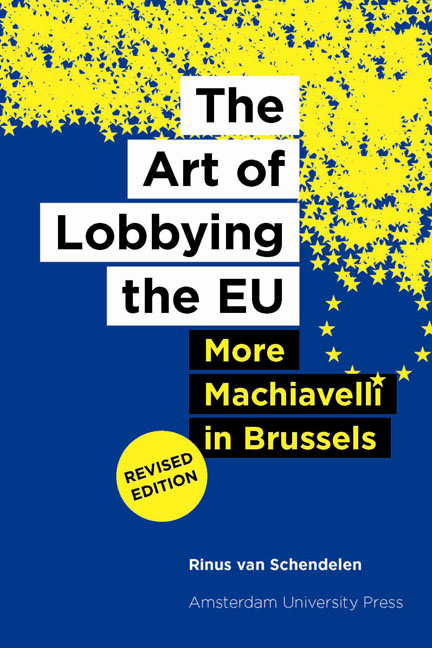Book contents
- Frontmatter
- Dedication
- Contents
- Detailed Contents
- Special Preface to the Fourth Edition: Ten Years’ Anniversary of this Book
- List of Figures
- List of Best Websites
- List of Abbreviations
- 1 The Europeanization of Public Affairs
- 2 The Playing-Field: EU Common Decision-Making
- 3 Pushing the Buttons of ‘Brussels’
- 4 Getting Grip on an EU Arena
- 5 Managing the Home Front
- 6 Managing the EU Fieldwork
- 7 The Limits of EU Public Affairs Management
- 8 Public Affairs, Lobbying and EU Democracy
- References
- Index
5 - Managing the Home Front
Published online by Cambridge University Press: 10 December 2020
- Frontmatter
- Dedication
- Contents
- Detailed Contents
- Special Preface to the Fourth Edition: Ten Years’ Anniversary of this Book
- List of Figures
- List of Best Websites
- List of Abbreviations
- 1 The Europeanization of Public Affairs
- 2 The Playing-Field: EU Common Decision-Making
- 3 Pushing the Buttons of ‘Brussels’
- 4 Getting Grip on an EU Arena
- 5 Managing the Home Front
- 6 Managing the EU Fieldwork
- 7 The Limits of EU Public Affairs Management
- 8 Public Affairs, Lobbying and EU Democracy
- References
- Index
Summary
Getting and maintaining a strong position in a foreign country presupposes either skilled ingenuity or fortune, but the more one relies on the former rather than the latter, the better one succeeds, according to Machiavelli (Prince, chapter 6). Which skilled ingenuity is needed at home for success in the EU?
I Who Is Lobbying, Why, for What and with What Result?
In this chapter, the interest group is the unit of analysis. It may be the MNC of Siemens, an NGO like Animal Welfare, the EuroFed Eurima (isolation products), the Warsaw city government, the Regional Affairs Ministry of Italy, the AmCham in Brussels, the Commission or any other public or private interest group inside or outside the EU. They all are formally established entities, but also have semi-formal and informal networks and groups that can each act as interest groups. Examples are a company's division, a ministry's bureau, a Commission DG, a DG's unit, an EP inter-group, a faction inside an NGO or the junior staff of an MEP. Alike formal entities develop external networks and platforms, so too do semi-formal and informal groups by creating an ad hoc coalition, an interface between industrialists and officials, an Irishmen's club, a meeting of Central European young officials or a regular dinner of Baltic ministers. Each can act as a sort of interest group. Thus, a formal entity has many parts inside and faces outside that make up its complex character, which in this chapter our focus from PA perspective. As sketched in figure 1.2 (left side) and summarized in figure 3.3, our leading question is ‘who is the character that is acting, why, for what and with what results?’ This relates to the entity's home affairs, such as its internal organization, strategy development, setting of agendas and targets and its performances. However, what are its parts inside and faces outside to which the questions apply and what are the answers?
The simple-minded interest group answers questions before they are posed. It takes its own group as autonomous entity, its motivation as selfevident and its objectives as clear enough. It divides the results into two categories: the losses that are blamed on others and the gains that come from its performance. In daily life it will continually blame others and whitewash itself.
- Type
- Chapter
- Information
- The Art of Lobbying the EUMore Machiavelli in Brussels (Revised Edition), pp. 205 - 244Publisher: Amsterdam University PressPrint publication year: 2013



